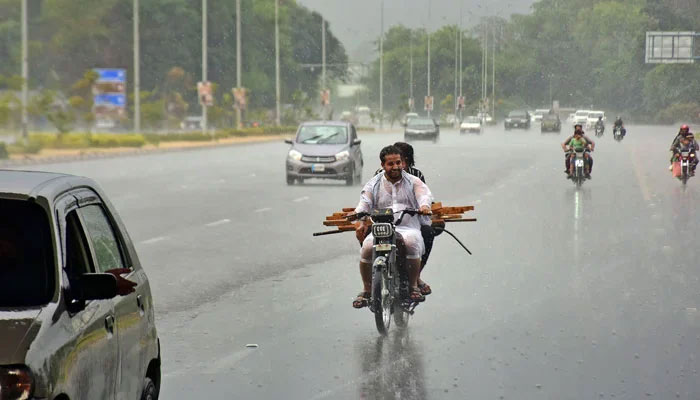Time to take measures to avoid monsoon related health threats
Rawalpindi : After the setting in of monsoon, the chances of spread of a number of infections such as viral hepatitis A&E, typhoid, diarrhoea, dysentery and other gastrointestinal problems have increased and according to health experts, it is time to educate public on how to avoid monsoon related health threats.
Every year, the rise in humidity and the setting in of monsoon in this region of the country cause a sharp increase in the number of patients with certain infections that is mainly because of hot and humid weather which allows bacteria to grow faster. The allied hospitals in town have to bear an extraordinary burden of patients with monsoon related health hazards.
Data collected by ‘The News’ has revealed that the allied hospitals in town including Holy Family Hospital, Benazir Bhutto Hospital and District Headquarters Hospital have already started receiving a significant number of patients with gastrointestinal infections. Nearly 20 per cent of the total cases being presented to the outpatient departments of the teaching hospitals in town are with gastroenteritis or with some other monsoon related health threat.
Experts say that the situation may get worse if effective prevention and control measures are not taken well in time particularly by the individuals. People must be aware of the fact that water pollution is the biggest threat to public health in monsoon almost all across the country.
The most common sources of water contamination are leaky or rusty underground water pipelines, cross-connections between water supply lines and sewerage drainage pipelines, improperly treated sewage disposal, agricultural chemicals, seepage into underground water aquifers and unclean storage tanks. The rain water after heavy rain falls accumulated on ground is mixed with sewerage and pollutes underground water aquifers.
Consumption of safe drinking water and foodstuff and having good hygiene including washing hands properly with soap particularly after going to the toilet and before having foodstuff or meals are must to avoid monsoon related health threats. Water having bacterial and chemical contamination is unsafe for human consumption. During monsoon, it is a must to protect water from contamination and drinking water must be sterilized by boiling or chlorination as ground water becomes contaminated due to frequent rains.
It is important that the major causes behind spread of gastrointestinal diseases during monsoon are consumption of unsafe drinking water, unfit foodstuff and poorly stored cooked food. Experts say that people should use boiled or chlorinated water for drinking. Water must be brought to ‘rolling boil’ for 5-10 minutes. Chlorination of water may be carried out by chlorine gas (on large scale), bleaching powder, chlorine tablets and chlorine stock solution.
Health experts say that kitchen utensils, vegetables and fruits should not be washed with stagnant water. Water should be stored in clean and covered utensils. Water after boiling should be used for preparing ice at home. During monsoon, it is the best option to cook food and consume it instantly instead of storing it. Also one should not store fruit after peeling or cutting. It is important that majority of the cases reported at the healthcare facilities during monsoon are with water-borne diseases. Water-borne illnesses can be life threatening as in Pakistan, nearly 1.2 million people die each year due to water-borne diseases. The water-borne illnesses account for nearly 60% of child deaths in Pakistan.
-
 Chloe Kim Set For Historic Halfpipe Gold Showdown At Milano Cortina
Chloe Kim Set For Historic Halfpipe Gold Showdown At Milano Cortina -
 Brooklyn Beckham Gives Cold Response To Cruz's Olive Branch Amid Feud
Brooklyn Beckham Gives Cold Response To Cruz's Olive Branch Amid Feud -
 Woman Arrested Months After Allegedly Staging Husband’s Murder As Suicide
Woman Arrested Months After Allegedly Staging Husband’s Murder As Suicide -
 Senior US Politician Makes Formal Accusation Against Andrew As Woman Under Him Is Sex Trafficked
Senior US Politician Makes Formal Accusation Against Andrew As Woman Under Him Is Sex Trafficked -
 X Product Head Warns AI Spam Can Make IMessage And Gmail Unusable
X Product Head Warns AI Spam Can Make IMessage And Gmail Unusable -
 Tyler Childers, Wife Senora May Expecting Second Baby
Tyler Childers, Wife Senora May Expecting Second Baby -
 ‘Smiling Electrons’ Discovered In Earth’s Magnetosphere In Rare Space Breakthrough
‘Smiling Electrons’ Discovered In Earth’s Magnetosphere In Rare Space Breakthrough -
 Cardi B Airs Chilling Threat To Authorities Over Arresting Her Fans
Cardi B Airs Chilling Threat To Authorities Over Arresting Her Fans -
 Bangladesh Sees High Turnout In Landmark National Election
Bangladesh Sees High Turnout In Landmark National Election -
 Lufthansa Cancels Hundreds Of Flights Amid Pilot And Cabin Crew Strike
Lufthansa Cancels Hundreds Of Flights Amid Pilot And Cabin Crew Strike -
 Video: Prince Harry Tears Up Talking Of His Court Case & Children: ‘Don’t Feel Shame Even If A Judge Makes Demands'
Video: Prince Harry Tears Up Talking Of His Court Case & Children: ‘Don’t Feel Shame Even If A Judge Makes Demands' -
 King Charles Issues New Statement For ‘carers’ Two Days After Promising To Support Police Action Against Andrew
King Charles Issues New Statement For ‘carers’ Two Days After Promising To Support Police Action Against Andrew -
 Gene Simmons Makes Major Claim Against Rock & Roll Hall Of Fame
Gene Simmons Makes Major Claim Against Rock & Roll Hall Of Fame -
 Vladyslav Heraskevych Disqualified From Winter Olympics 2026 Over Helmet Controversy
Vladyslav Heraskevych Disqualified From Winter Olympics 2026 Over Helmet Controversy -
 Late James Van Der Beek Inspires Bowel Cancer Awareness Post Death
Late James Van Der Beek Inspires Bowel Cancer Awareness Post Death -
 ByteDance’s New AI Video Model ‘Seedance 2.0’ Goes Viral
ByteDance’s New AI Video Model ‘Seedance 2.0’ Goes Viral




